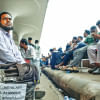150 duped Bangladeshis stranded in KL building

For the last four months, Rafiqul Islam [a pseudonym to protect him from further consequences] has been stuck in an abandoned three-story building in Kuala Lumpur along with 149 others -- all without any work.
"Please save us. We are getting sick physically and mentally. If no one saves us, we will have to die by suicide here," he told this correspondent over the phone.
Dreaming of a better life, they went to Malaysia by spending lakhs, with some taking on loans at high interest rates to manage the brokers' fees. The brokers promised construction jobs that paid Tk 70,000-80,000 a month.
Soon after landing in Kuala Lumpur, the agents of the construction company that supposedly employed them confiscated their passports.
"We cannot go out except to buy water. We do not even have water to drink. Each day, we struggle to find water for bathing. The agents provide rice, potatoes, and pulses for us to cook. How long can anyone live like this?"
Like Rafiq, Shihab Uddin, [not real name] from Gobipur village in Meherpur, is another victim. He sold his agricultural land to manage the Tk 5 lakh broker's fee to come to Malaysia.
"My family sent me here hoping that I would be able to support them better. I don't know what will happen next. We don't know whether we would find any work here."
Shihab went on to appeal to the Bangladesh government to help them find a job. Otherwise, they would be left with no choice but to face dire consequences.
According to the government's count, a worker can go to Malaysia with only Tk 78,000. However, most of them paid between Tk 3.5 lakh to Tk 5.3 lakh to go there, but they still did not find any work.
Amid the situation, fifty people were taken to Malaysia on calling visas by a recruiting agency named Catharsis International on February 22, without any cost, which, according to migration experts, may exacerbate the crisis among migrant workers in Malaysia.
"The entire process of sending migrant workers to Malaysia is flawed. There is a large syndicate operating at both ends, leading to the deception and suffering of thousands of migrant workers for years," said Shariful Hasan, associate director at BRAC Migration Programme and BRAC Youth Platform.
He suggested establishing an independent recruitment commission to identify those involved and take appropriate action, while also streamlining the process with lower costs to ensure all workers secure jobs according to their skills.
Some people from both Malaysia and Bangladesh are involved in the process, said Ali Haider Chowdhury, secretary general of the Bangladesh Association of International Recruiting Agencies (Baira).
"With the Malaysian government now imposing fines on employers who fail to provide jobs, we hope these workers will soon find employment."
He also called for collaboration with the ministry of expatriates' welfare and overseas employment and the Malaysian embassy to alleviate the problem.
"The Bangladesh Embassy in Malaysia is working to address the migrant workers problem," said Shofiqur Rahman Choudhury, the state minister for the ministry of expatriates' welfare and overseas employment.
The embassy's labour wing is actively addressing the workers' issues.
"Officials from our embassy are conducting investigations, and appropriate actions will be taken based on their findings," he told journalists.

 For all latest news, follow The Daily Star's Google News channel.
For all latest news, follow The Daily Star's Google News channel. 








Comments